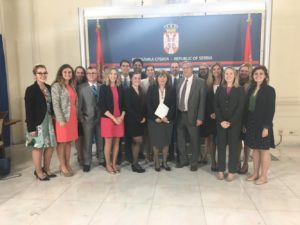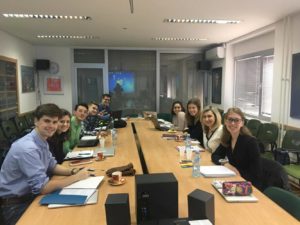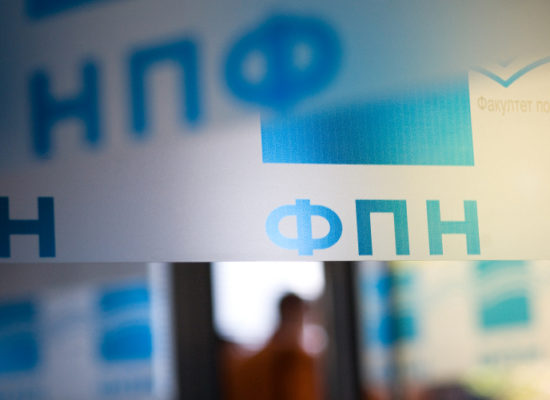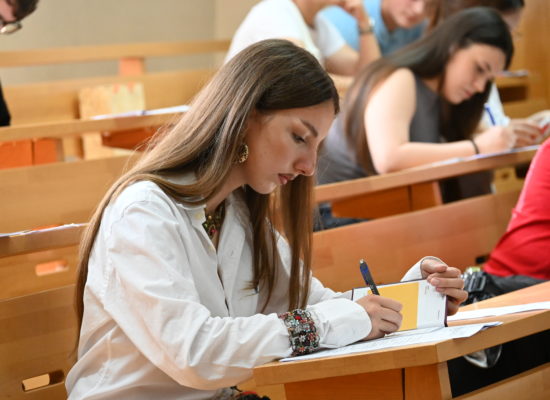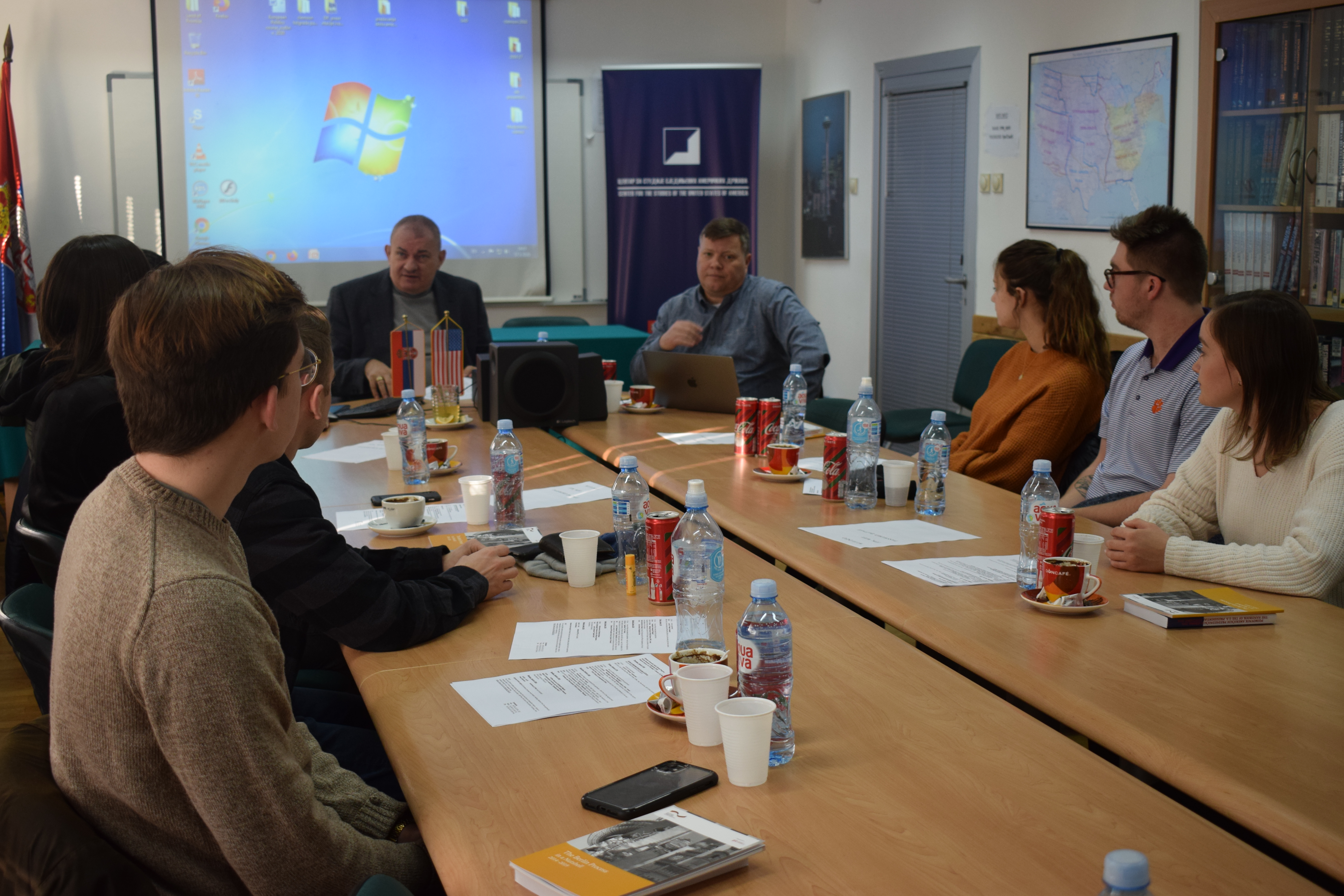
Стратешко партнерство Универзитета Клемсон из Јужне Каролине (САД) и Центра за студије САД Факултета политичких наука Универзитета у Београду
Department of Political Science receives State Department funding for faculty, student exchanges
Frances Parrish, College of Behavioral, Social and Health Sciences, Clemson University
November 4, 2020
Clemson Department of Political Science has had a long collaboration with the University of Belgrade that began in 2006 with faculty-led study abroad trips.
Image Credit: Department of Political Science
Starting this month, political science students at Clemson University will have the chance to work and learn virtually with students in Belgrade, marking the beginning of a two-year exchange program funded by the U.S. State Department.
The Department of Political Science has received a $104,000 grant from the U.S. Embassy in Belgrade for faculty and student exchanges and the development of long-term collaborations with faculty at the University of Belgrade. Grant partners include Jeffrey Peake, chair of the Department of Political Science, Kyle Anderson of the Clemson Office of Global Engagement, Dragan R. Simic, Dean of the Faculty of Political Sciences, University of Belgrade, Director and Founder of their Center for the Studies of the United States of America and Dragan Zivojinovic, secretary of the Center for the Studies of the United States of America.
According to Anderson, the proposal was the one of the two funded out of 15 applications.
“The focus on international virtual exchange was one of the application’s strong points,” Anderson said. “Supporting virtual collaborations ultimately makes the exchange more versatile, sustainable and accessible.”
Students in Peake’s U.S. Foreign Policy course will participate in virtual classroom collaborations with students at the University of Belgrade to discuss the 2020 U.S. presidential election. Starting next semester, faculty will deliver virtual guest lectures, and the virtual collaborations will expand to other courses. There are also plans in the grant for future exchanges where students from Belgrade will come to Clemson, starting in fall 2021.
“The more perspectives students hear, the more they gain a deeper understanding of the world,” Peake said. “When we take our students abroad, they see the other perspective, and it’s such an eye-opening experience. I can only hope that when Belgrade students come here physically or virtually, it’s the same experience for them as well.”
This exchange program is part of a long collaboration with the University of Belgrade that began in 2006 with Clemson faculty-led study abroad trips. The Department of Political Science has had four faculty members – Peake, Laura Olson, Vladimir Matic and Brandon Turner – travel to Belgrade to talk with students on topics related to American politics, democratic theory and religion in politics.
Thus far, this exchange has resulted in an externally funded collaborative research grant on religion and politics, with Olson as the lead investigator. Peake anticipates revamping this exchange program with assistance from the recently received State Department grant.
In Fall 2021 and 2022, University of Belgrade undergraduate and graduate students will travel to Clemson for either in-person or virtual classes on topics including American politics, democratic theory and international relations. In Spring 2021, Peake plans to expand the program with additional courses in other disciplines, connecting students with fellow departments in the Clemson University College of Behavioral, Social and Health Sciences.
“Because of this interdisciplinary exchange, there might be colleagues in other departments who want to participate,” Peake said. “Connecting with more faculty and students in other departments will allow for even more students to have this unique experience.”
Short-term faculty exchanges between the department and the University of Belgrade will also begin in April 2021. Peake said the hope is to have future weeklong visits for Clemson faculty in Belgrade, pending the removal of travel restrictions due to the COVID-19 pandemic.
Image Credit: Department of Political Science
These types of exchanges allow students to hear different perspectives, which help them gain a deeper understanding of the world.
Peake said that these exchange programs not only provide a benefit for students and faculty, but also the U.S. and Serbia, as they help them reconcile from the 1999 bombing of Belgrade by the United States. According to Peake, Clemson students will be taking classes with students who are the children of those alive during the bombing, which aids in the reconciliation as the new generation connect with one another.
“To reconcile with those countries is really important, and that starts with young people, and exchanges like this,” Peake said.
Dragan Simic, Dean of Faculty of Political Sciences at the University of Belgrade, said that the partnership with Clemson University since 2006 has grown through the years and has also been like a window to the world.
“When our collaboration went one step further with ‘Clemson Study Abroad – spring semester in Belgrade’ in 2016, a unique phenomenon in Serbia’s education system, it was proof that we may be a reliable partner to such a remarkable institution like Clemson University,” Simic said. “Now with this university partnership grant, I think we have reached a new level in our relationship, that will, especially in light of the pandemic, help us sustain and strengthen our partnership.”
The Clemson University Department of Political Science is part of the University’s College of Behavioral, Social and Health Sciences (CBSHS). Established in July 2016, CBSHS is a 21st-century, land-grant college that combines work in seven disciplines – communication; nursing; parks, recreation and tourism management; political science; psychology; public health sciences; sociology, anthropology and criminal justice – to further its mission of “building people and communities” in South Carolina and beyond.

